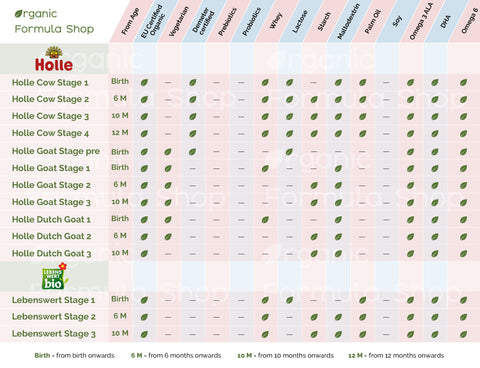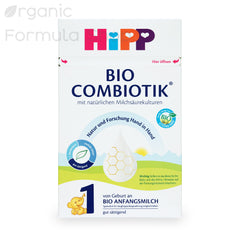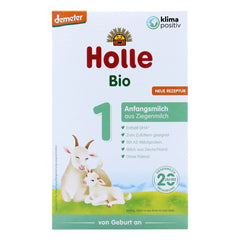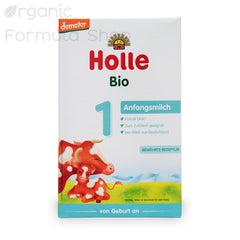2026 Formula Guide: Best European Organic Baby Formula
A mother's choice to breastfeed or bottle feed is highly personal and can be affected by several factors. We all know the advice: "Breast is best." For some moms, that advice is easy to follow. But for many moms, it's not. Luckily, there are excellent alternatives for breastfeeding to ensure adequate nutrition for your little one. An alternative to breastfeeding is formula feeding your baby. Choosing the healthiest formula means giving your child, at each specific age, all of the essential nutrients in the right amounts.
Making the best possible choice can be overwhelming at best, but the good thing is that we have done the research for you! This article is an in-depth guide for parents who (are going to) formula-feed their babies. We will provide all the necessary information to help you find the right organic formula for your little one.
Formula Fact:
While breastfeeding is best, it is not always possible for parents or caregivers.
Formula Feeding Vs. Breastfeeding
Choosing whether to breastfeed or formula-feed your baby is one of the hardest decisions new parents make. Pediatricians say that breastmilk is the best nutritional choice for infants. Breastmilk is naturally full of the nutrients your baby needs. However, breastfeeding may not be possible for all parents due to different circumstances. For example, some moms can't breastfeed due to their lifestyle or specific medical situations, or if parents are the same gender or have adopted a baby. The most important thing is the love you give to your newborn and that you and your baby are both happy and healthy. That's why we say 'Breast isn't always best'; FED + LOVE is best! Organic infant formula can be a healthy alternative for parents who can't breastfeed or decide not to. A good organic Baby Formula gives babies the nutrients they need to grow and thrive.
Formula closest to breastmilk
When you have decided to supplement or exclusively feed your little one with baby formula, you want a formula that resembles breast milk.
When looking for the best quality baby formula similar to breast milk, you want to ensure that your little one's baby formula is organic and made with wholesome ingredients. When ordering European Organic Baby Formulas, you can rest assured that the manufacturers have produced their formulas according to the strict organic regulations set by the European Food Safety Authority (EFSA).
What Is Organic Baby Formula?
Organic baby formula is made with at least 95% organic ingredients. This means all of the ingredients in the formula have to be grown or produced according to organic standards, which include:
- No GMOs (Genetically Modified Organisms)
- No hormones or steroids used on animals or added
- No artificial colors or flavors
- No antibiotics
- No pesticides or insecticides
- All animals are fed an organic diet
- No synthetic/artificial preservatives
--------------------------------------------
Good to know:
Certified Organic is different than "made with organic ingredients." The latter means that 70% of the ingredients are organic, not 95% as with Certified Organic.
--------------------------------------------
Organic European Vs. Organic American Formula
What makes European formulas so good? Well, Not all organic products are created equal. The guidelines for baby formulas set by the European Food Safety Authority (EFSA). are way stricter than the regulations set by the FDA.
European baby formula manufacturers use cleaner ingredients and follow stricter regulations regarding nutrient composition, usage, and nutrients than American formulas. The ingredients used are often cleaner and of a higher quality.
Here are some key differences you can find in European baby formulas vs. American baby formulas:
- US formulas only contain 70% organic ingredients, unlike European formulas, which contain 95% organic ingredients
- European formulas must have at least 30% of calories from lactose, which is not required for U.S.-manufactured formulas.
- EFSA standards prohibit the inclusion of sucrose (table sugar) in baby formula, except in small quantities in some specialty formulas for premature (Preemie) infants or infants with allergies.
- Certified " Organic" by the EFSA means that the formulas contain no GMOs, pesticides, hormones, or steroids.
So, why buy European Baby Formula? The reasons above speak for themselves!
(If you would like to know more about what sets EU and US formulas apart, click here.)
The Hipp, Holle, Kendamil, and Lebenswert brands we carry go beyond the EU’s minimum organic standards with their DE-ÖKO, Demeter, EcoCert and Bioland certifications.



Stage & Age with Baby Formulas
In the United States, most baby formula is not sold in stages, meaning that the nutrient levels have to be appropriate for babies of all ages. This vital element separates the one-size-fits-all American approach from sized-to-fit European formulas.
--------------------------------------------
Formula Fact:
Babies should gain 1oz a day for the first three months.
--------------------------------------------
European baby formula uses labeling for ages to meet developmental and nutritional needs per age. The nutritious needs of a newly born baby are just different from those of a 10-month-old baby. The stages of European baby formula are specific to the phase of nutritional development the baby is in, as opposed to their calendar age. Stages in European baby formulas have a specific balance of fats, proteins, iron, and vitamins. This allows parents to find the baby formula that is best suited to the child's individual needs. We offer four different Stages of E.U. Organic Baby Formulas:
Stage PRE Baby Formula (Specifically for newborns)
Stage PRE formulas are very similar to Stage 1 and are suitable from birth onwards. Despite the name, they are not related to premature babies ("preemies"). The main difference is that Stage PRE baby formulas do not contain starch, which can sometimes be difficult for babies to digest.
Stage 1 Baby Formula (from birth to 6 months)
The nutritional content of Stage 1 formula aligns with the nutrients, vitamins, and minerals that babies need at this stage. All Stage 1 formulas, also known as "first infant milk," can be used as a complete source of nutrition or as a supplement to breast milk.
Stage 2 Baby Formula (For babies 6 months and older)
Stage 2 formula (also known as "follow-on formula") is designed for babies from six months to a year (or, depending on the brand, until 10 months). It has slightly higher amounts of protein and certain other nutrients to fit a growing baby's needs. The main difference in these formulas is that Stage 2 formulas contain more iron, vitamin D, and calcium.
Stage 3 Baby Formula (For babies who are 10 & 12 months and older)
Stage 3 formula (or "growing-up milk" and "toddler milk") is intended for use after the age of 10 months or one year, depending on the manufacturer. For products sold in Germany and the Netherlands, Stage 3 is labeled for 10+ months and older, whereas in the United Kingdom, Stage 3 is labeled for 12+ months.
Stage 4 Toddler formula (For babies 12 to 36 Months)
Our Stage 4 European Organic Baby Formulas, are specially designed to meet the nutritional needs of growing toddlers of one year (12+ months) or older. This stage is intended as a supplement to solid foods for toddlers and will support your little one after their first birthday all the way through their toddler years. Hipp Dutch Stage 4 is designed for toddlers of 24+ months and our Holle Bio Stage 4 for 12+ months.

Types & Brands of European Organic Formulas
To narrow things down, we offer three brands of world-class European baby formula:
Hipp
The HiPP brand was founded in Germany in 1899 and has been an innovation leader in baby food, organic, and ecological businesses ever since. HiPP goes the 'extra mile' to ensure its formulas are of the highest organic quality, analyzing all ingredients for traces of over 1,000 substances. They exceed the legal requirements needed to call a product organic. HiPP is known to mimic breastmilk as closely as possible and is made possible by a team of infant nutrition experts using over 55 years of breastmilk research.
Kendamil is a UK-based company dedicated to producing premium, organic infant formula made from the finest ingredients. With a focus on sustainability, they source milk from grass-fed cows and use no palm oil in their formulas. Kendamil’s commitment to quality and innovation has earned them multiple awards over the years. Their formulas are carefully crafted to provide babies with the most natural and nutritious start in life, proudly carrying the Red Tractor certification, which ensures high standards of food safety and traceability. Parents trust Kendamil for its dedication to both baby health and the environment.
Holle
The Holle brand is backed by almost a century-long tradition of organic goodness. All their baby formulas are free from chemicals, preservatives, artificial flavorings, GMOs, and added sugar. Holle holds itself to a high standard with its Demeter certification and is a market leader in sourcing organic ingredients from biodynamic farms. Demeter is the top certification for biodynamic farms, requiring annual renewal. Holle recently took things one step further: All of their milk formulas are now climate-positive!
Lebenswert

Important to know is that Lebenswert is part of the Holle Family. It was introduced about ten years ago to give parents a cheaper alternative to organic and high-quality baby formula. The Bioland certification of all Lebenswert ingredients means that the formula is derived from farms that abide by high standards of farming practices.
The products of HiPP, Holle, Kendamil, and Lebenswert can be categorized into a few types of formulas:
Organic Cow's Milk Formulas
The most common base for organic baby formulas is Cow's milk. Most organic cow's milk formulas are made with skimmed milk that has been supplemented with a blend of organic vegetable oils to create a fatty acid profile which is comparable to breast milk.
Organic Goat's Milk Formulas
These formulas provide the same nutrients as cow's milk formulas. Still, they may be more suitable for newborns who have trouble digesting cow's milk formula or show symptoms such as eczema, skin rashes, or bloating, indicating a milk protein intolerance. Goat's milk formulas are gaining popularity, and many parents prefer goat milk regardless of a milk protein intolerance. Goat milk formula naturally contains higher levels of vitamins A and C, magnesium, and calcium when compared to cow's milk.
Hydrolyzed Formulas
Cow's milk protein allergy (CMPA) affects an estimated 2% to 7,5% of infants. While infants with a severe allergy are more likely to need a special amino acid-based formula, infants with cow's milk protein sensitivity or a milder form of intolerance may benefit from a hydrolyzed formula in which the milk proteins have been broken down into smaller particles, making it easier digestible.
Please note: HiPP Hypoallergenic (HA) baby Formulas are technically not organic because hydrolyzed milk protein is unavailable in organic form. However, all other ingredients included are organically sourced.
Specialty Formulas (Formulas for sensitive tummies)
Feeding difficulties are common among young infants whose immature digestive systems may need some help breaking down the nutrients in formula. We offer a range of premium specialty formulas that have been developed to help ease some of the most common feeding and digestive problems: Spit, Acid Reflux, Colic, Constipation, and Gassiness.
Vegetarian baby formulas are made to meet your baby's specific dietary needs while following vegetarian principles. These formulas use plant-based DHA from sources like algae oil, offering a nutritious and sustainable alternative to fish-based options. At Organic Formula Shop, we proudly offer a selection of vegetarian formulas made with premium cow's milk and goat's milk from trusted EU brands like HiPP, Kendamil, and Holle. These top-quality formulas provide the best start for your baby's early development!
--------------------------------------------
Formula Fact:
A 4-month-old consumes twice as much milk as a toddler
--------------------------------------------
Ideal Ingredients
Premium baby formulas can never replicate all of the components of breast milk, like antibodies and hormones. But these European organic formulas contain ingredients that approximate breast milk to the highest possible degree. Here's a List of ideal ingredients you want to look out for and that are used in most of our products:
Lactose (aka: "milk sugar")
The main carbohydrate in breast milk is lactose, which is also found in cow's and goat's milk but in smaller quantities. Thus, in addition to a base of organic cow's or goat's milk, the best organic formulas often contain additional Lactose to approximate breast milk's high carbohydrate content. Lactose is the predominant carbohydrate source in the HiPP formulas we carry.
Organic Skimmed Milk
The milk in the organic formula comes from cows and goats treated with high welfare standards, fed a diet of grass and organic grain, and kept on sustainably run farms. This makes their milk as pure as possible, improving its taste and nutrient content. The cow's milk used in Holle Bio meets the Demeter standard, while Lebenswert milk meets the Bioland standard. These certifications go beyond the European Union's basic standards for organic farming.
Organic whey protein
Baby formulas from birth to 6 months of age contain mainly whey proteins, while baby food for children over six months often contains more casein. Whey and casein protein are the main components of goat or cow's milk. They are building blocks for your child's body and are catalysts for various biochemical processes.
Organic vegetable oils
The fat in the European Organic formulas comes from a blend of organic vegetable oils. Most commonly, palm oil, sunflower oil, and rapeseed oil. Some formulas even contain coconut oil. These vegetable oils are added to a base of organic skim milk to provide the correct quantities of infant fatty acids, like palmitic and oleic acid.
Vitamins and minerals
All organic baby formulas we carry contain various vitamins and minerals, such as vitamins A, B, C, D, and K, iron, calcium, and potassium.
DHA
All European formulas for babies under one year must contain DHA (omega-3 fatty acid docosahexaenoic acid) as of Spring 2020. DHA contributes to babies' cognitive development and healthy brain function. Organic formulas typically contain additional omega 3 & 6 polyunsaturated fatty acids such as linoleic acid (L.A.), arachidonic acid (ARA), and alpha-linolenic acid (ALA).
Probiotics & Prebiotics
To imitate the immunity-boosting properties of breast milk, many organic formulas also contain prebiotic fibers and probiotics (such as Lactobacillus). Among other benefits, these special ingredients promote a healthy digestive system. All our HiPP formulas contain prebiotics, and most contain probiotics. Our Lebenswert and Holle formulas do not contain probiotics or prebiotics, allowing parents to give their baby a simple formula or add probiotic drops if needed.
Ingredients to Avoid in Organic Baby Formula
Now that we have reviewed a list of suitable components that nourish your little one. In contrast, let's look at the list of ingredients to avoid when choosing a formula.
Added sugar
Too much sugar can be dangerous for small children. It has been associated with vitamin B deficiency in children, and these vitamins are important for normal digestion and the absorption of carbohydrates in young children.
Soy
Children's food should not in any way contain genetically modified soy.
Gluten
Preferably, baby food must only contain gluten once they are at least six months of age. Gluten is poorly broken down in the body of newborns. It can also provoke the development of "celiac disease" (gluten heteropathy).
Phytin
Phytin is a substance that interferes with the absorption of calcium, salts, and vitamin D. The problem is that phytin contains phosphorus.
Gliadin
Gliadin is a substance contained in the shell of cereals that provokes necrosis of the intestinal villi. These villi are necessary for the absorption of nutrients into the body and thus are important to the health of your baby's body.
Carrageenan
In US-manufactured infant formulas, carrageenan is added as a stabilizing agent in ready-to-feed formulas. However, the E.U. does not allow it to be added to organic formulas because it causes intestinal inflammation.
Synthetic Nutrients
Synthetic nutrients can be present in formulas manufactured in the U.S. These products can harm your baby because they're filled with harmful chemicals called carcinogens. It has been found that infants given formulas with synthetic fillers are more likely to develop chronic diseases as they grow up.
Baby Formula Comparison Chart
All of our organic formulas contain Lactose, Omega-3, Omega-6, and DHA and are soy-free. When it comes to other ingredients, our formulas differ slightly. Below is a detailed chart comparing all of the best organic baby formulas based on the main ingredients in baby formula.

Please Note: Our HiPP HA, Comfort & Anti Reflux (AR) Formulas are technically not organic because hydrolyzing the milk protein requires more processing. However, all other ingredients included are still organic.


Click here to check our baby formula comparison chart in full size to help you understand the differences between the formulas we offer.
Our organic Formula Recommendations
We're finally here! Now that you have all the background, we can give you our top picks for our organic formulas and look at how they fit every age, stage, and nutritional need.
#1 HiPP Dutch Organic Formula

HiPP Dutch Stage 1: for babies aged 0 - 6 months of age
HiPP Dutch Stage 2: for babies aged 6 - 12 months of age (Follow-On formula)
HiPP Dutch Stage 3: for toddlers aged 10 months and up (Toddler Formula)
HiPP Dutch Stage 4: for toddlers aged 24 months and up (Junior Formula)
Since day one, our Hipp Dutch formulas have been our customers' favorite and best-selling formulas. This is no surprise because these formulas have long been known as the best European formulas, and they're a kind of "golden benchmark" for organic, nutritionally complete infant cow milk formulas. The ingredients in HiPP Dutch are entirely GMO-free, meeting the European Union's strict standards for organic agriculture. It's also free from artificial preservatives. The main ingredients are organic skim milk, organic Lactose, organic whey, and organic vegetable oils. Also, they contain a wide range of vitamins, minerals, prebiotics, probiotics, and long-chain polyunsaturated fatty acids, such as DHA. It also comes in an easy-to-dispense, airtight container!
#2 Kendamil Classic

Kendamil Classic Stage 1: for infants aged 0 - 6 months of age
Kendamil Classic Stage 2: for babies aged 6 - 12 months of age (Follow On formula)
Kendamil Classic Stage 3: for toddlers aged 12 months and up
#3 HiPP Organic UK Formula

HiPP UK Stage 1: for infants aged 0 - 6 months of age
HiPP UK Stage 2: for babies aged 6 - 12 months of age (Follow On formula)
HiPP UK Stage 3: for toddlers aged 12 months and up
HiPP UK is also quite similar to HiPP Dutch. At approx half a dollar cent ($0.050) per gram, it is the best value and a healthy organic infant formula option we carry. The main difference between HiPP UK and HiPP Dutch (besides the price) is that HiPP UK contains only prebiotics and no probiotics.
#4 HiPP German Organic Formula

HiPP German Stage Pre: for infants aged 0 - 6 months of age
HiPP German Stage 1: for infants aged 0 - 6 months of age
HiPP German Stage 2: for babies aged 6 - 10 months of age (Follow On formula)
HiPP German Stage 3: for toddlers aged 10 months and up
HiPP German Stage formulas are a natural, easy-to-digest formula suitable from birth. It comes packed with an excellent spread of probiotics to help support your baby’s immune system and brain development. Hipp's main carbohydrate is lactose, so you won’t have to worry about unnecessary fillers. Each formula contains a wide selection of vitamins and minerals. To support immune health, vitamins A & C blend into the formula. Next, vitamin D adds to support bone health and joints. Finally, Omega 3s and 6s (DHA & ARA) combine to help the brain and muscle tissue grow.
#5 HiPP Hydrolyzed Formula

HiPP Dutch HA Stage 1: for babies aged 0 - 6 months of age
HiPP Dutch HA Stage 2: for babies aged 6+ months of age
HiPP German HA Stage Pre: for infants aged 0 - 6 months of age
HiPP German HA Stage 1: for infants aged 0 - 6 months of age
HiPP German HA Stage 2: for babies aged 6 - 10 months of age
HiPP Hydrolyzed (HA) baby formula is casein-free and contains protein hydrolysates that break down proteins for infants with sensitive stomachs. The Hypoallergenic Formula Line from HiPP is specially developed for babies prone to allergies. Milk protein can be an essential factor in triggering allergies. The milk protein in the HiPP Hypoallergenic formulas is split into smaller molecules. HiPP HA uses a protein that is wholly hydrolyzed and was proven by studies to prevent allergies. This hypoallergenic formula has highly broken down proteins that your baby’s body is less likely to see as a threat and, thereby, is less likely to react to. We Carry the German version (in a box) and the Dutch version (in a can as displayed).
Please Note: Our HiPP HA, Comfort & Anti Reflux (AR) Formulas are technically not organic because hydrolyzing the milk protein requires more processing. However, all other ingredients included are still organic
#6 Holle Organic Goat Milk Formula

Holle Goat Stage Pre: for infants aged 0 - 6 months of age
Holle Goat Stage 1: for infants aged 0 - 6 months of age
Holle Goat Stage 2: for babies aged 6 - 12 months of age
Holle Goat Stage 3: for toddlers aged 10 months and up
Rather than resorting to a heavily processed US-manufactured formula, Holle Goat offers an alternative made with natural ingredients such as whole organic goat’s milk, organic lactose, organic maltodextrin, and a blend of organic vegetable oils. Click here to see our whole range of Holle Goat Formulas.
#7 Holle Organic Cow Milk Formula

Holle Cow Stage 1: for babies aged 0 - 6 months of age
Holle Cow Stage 2: for babies aged 6 - 10 months of age (Follow On formula)
Holle Cow Stage 3: for toddlers aged 10 months and up
Holle Cow Stage 4: for toddlers aged 12 months and up
Holle Organic Stage 4 Cow’s Milk Formula is designed for babies aged 12-24 months transitioning to toddlerhood and provides all the nutrients they need to thrive. The Holle stage 4 baby formula is suitable for drinking as part of a mixed diet or for preparing porridge.
Recap
Although no “perfect” formula exists, specific premium baby formulas can help set your baby up for the best possible (healthy) start in life. Clean, nutritious, organic formulas like HiPP, Holle, Kendamil and Lebenswert have supported countless babies globally. They have helped them grow happy, healthy, and thriving. Hopefully, this guide has given you some food for thought about what sets organic formula, mainly organic formula from Europe, apart from the conventional formula. As you know, the best thing you can do as a parent is to keep your little one fed, happy, and healthy!
Not sure which formula to order?
Organic Formula Shop offers safe European formulas that will give you peace of mind and comfort. It’s key to know that you are giving your baby nutrition that mimics breast milk as closely as possible and is made with premium organic ingredients. Contact our dedicated customer support team at Organic Formula Shop for expert advice and guidance tailored to your baby's needs. They have earned hundreds of 5-star reviews from our customers, helping you to provide the best nutrition for your little one. Contact us here or shoot us an email at support@organicformulashop.com. We are here to help!
Please note: every person and situation is different, so we always advise you to talk to your pediatrician first and see how these guidelines and tips can help you. This guide is not a substitute for professional medical advice, diagnosis, or treatment.

